Writing
Biz Lessons from the Diner, Zola Twitter Style
OK listen up. Long story.
So I’ve been having these cravings for pork & pineapple. No idea. So today I walk by the local diner & see an ad for BBQ pork + pineapple omelets.
So I’m like damn, my craving! I lowkey sit at the counter cuz it’s busy. Coat’s not off & the busser puts coffee down–nice!
I ask, can I order and he’s like no the waiter has to do it and he points to a server who looks about 17 waiting on a booth behind me.
So I’m like ok, drink coffee a while & the server never comes! He’s walking between the counter & booths, doesn’t even look at me!
I think maybe he thinks I’m just drinking coffee so I lay the menu closed flat away from me. Cuz that’s the signal to order food now!
Nope. Then this baby server (NOT the same one) asks a guy a few seats on my left if he’s ready to order. I say to the couple on my right:
“AM I IN THEIR BLIND SPOT or what” & we’re laughing but I’m annoyed. The couple’s all casual, talking to me.
Now the busser refills my coffee and I ask can he get a waiter. He goes straight away & talks to them. So I’m like ok, they’re ready.
Nope. 17 goes past, no eye contact, asks people who sat after me for their order. I WAS DONE. I WAS HANGRY.
I get my things & say to the couple I can’t deal w/this today. Real quick the woman jumps up, says “No I’ll find someone, I know the owner.”
I just want to go but I was like yea ok & this normal age guy comes over all “I’m in another section but I can take your order.”
I’m like I just want the omelet special but nobody is looking at me except the busser. He goes I’m real sorry, you want hashbrowns.
Then the woman goes “Put it on my tab” and I say OMG you’re so nice thank you but I’m thinking damn my stupid craving.
Then the normal age waiter goes “No, it’s on the house I’m sorry you had to wait.” I was like OHHH, well thank you.” Awkward silence.
I get my food & 17 is by every 10 min, how is it, coffee? The couple’s talking w/me, glad you stayed & all. We’re saying he’s young, he…
Doesn’t know to watch the room. I feel stupid but the omelet is good, the pineapple’s on the top not inside, but it’s good.
The couple’s my new BFFs, we exchange #’s & they tell 17 they tipped him & the normal age waiter in their bill & say bye and leave.
I ask 17 “did you just not see me?” Cuz he didn’t apologize & for real I wanted to know what was what. He just says “I got double-seated.”
Then I’m done eating & he goes “my manager said it’s free.” SO I tip $10 & say thanks, know you’re busy. But I’m thinking you saw me…
But didn’t make eye contact & say “be right w/you” & why did he serve later people BEFORE me, TF?
I don’t care about getting comped or waiting, it was being flat out ignored like nobody was going to serve me ever. Awkward as hell.
I don’t want to go back there cuz I’m embarrassed. But there’s one good thing: made me think how to do better in any kind of biz.
Acknowledge customers because NOBODY LIKES TO BE IGNORED. Apologize for screw ups. Serious, don’t pretend you didn’t screw up.
And if you read this whole thing to get to the biz part at the end you’re hilarious!
This Twitter-style post was inspired by Zola’s brilliant Twitter storytelling, which was repackaged into Storify by Mike.
Writing About the Writing on Jezebel
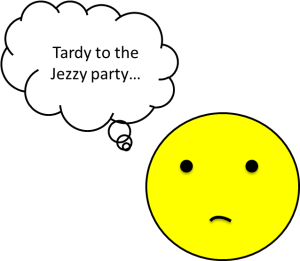 I’ve only recently discovered Jezebel and now have the pleasure and pain of reading old articles that I’m too late to comment on. It’s like reading about conversations on topics I care about that took place at the most amazing dinner party that I didn’t know I had been invited to.
I’ve only recently discovered Jezebel and now have the pleasure and pain of reading old articles that I’m too late to comment on. It’s like reading about conversations on topics I care about that took place at the most amazing dinner party that I didn’t know I had been invited to.
The articles are well-written and sometimes shine a light on under-represented groups and the dark sides of societal norms. These pieces are especially interesting to me because I’m trying to be aware of situations when my unconscious biases need to be checked.
Since I’m too late to be part of the discussion in the comments, writing about them is the next best thing.
My favorite post from the past is “A College Freshman Turned in My Blog Post as His Homework” by Dodai Stewart. Stewart was notified by a college professor that a “…white male student attempted to get by on the intellect of a brown woman…by stealing her work on appropriation.” Stewart describes the incident and aftermath, and ponders how to respond to the student’s apology.
The plagiarized work was from Stewart’s piece “On Miley Cyrus, Ratchet Culture and Accessorizing With Black People”.
There are 854 comments on the post and almost all of them are insightful, informative, hilarious, or a combination of all three. When I was done, I felt like I’d read a book that wove together bits of information on college writing skills, plagiarism, flimsy apologies, cultural appropriation, and humor.
I’ve given up reading comments on most sites because the hatred expressed makes me fearful and depressed for the state of humanity. But Jezebel comments…so little trolling and the snark is good-snark. It’s smart without the “smarter than thou” tone.
I’ve got Stewart’s piece bookmarked so when I’m miserable from political campaigns and social network posts that read like hate speeches, I can return to a beacon of hope in the dark world of the interwebs.
Blahg Blahg Blahg
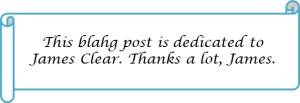 I didn’t publish a blog post last week. Work was great, but I was feeling the accumulated effect of other stresses in my life and when Thursday evening came around, I went to bed early instead of writing a post. I figured I would post something by Sunday at the latest, because I’ve done that before when I didn’t feel like I had the energy to meet my self-imposed Thursday deadline.
I didn’t publish a blog post last week. Work was great, but I was feeling the accumulated effect of other stresses in my life and when Thursday evening came around, I went to bed early instead of writing a post. I figured I would post something by Sunday at the latest, because I’ve done that before when I didn’t feel like I had the energy to meet my self-imposed Thursday deadline.
Then it was the weekend and I slept through a lot of it, spent some time planting and watering and pruning the shrubs and trees around my house to relax, and zoned out reading books. Then on Sunday night instead of writing a blog post I started laying out a poetry manuscript for a chapbook contest that is ending soon. I stayed up way too late, until 3AM, sorting through my poems and formatting them into a 6 x 9 inch word document. Didn’t finish the chapbook and didn’t even attempt a blog post.![]()
Monday I was exhausted, of course, and went to bed early again. And today I rushed from one meeting to the next and to appointments after work and got in bed at 8:30PM for another early night. I read through my emails on my smartphone to make sure I didn’t miss anything important before going to sleep, and read this:
“What I Do When I Feel Like Giving Up”, by James Clear. It starts off with “I’m struggling today. If you’ve ever struggled to be consistent with something you care about, maybe my struggle will resonate with you too.” And then he goes on to write about how he’s consistently posted on his blog twice a week since November 2012.
Dammit, James.
I was ready to push off the guilty, nagging feeling I had about not blogging and prioritize my rest. Until I read his damn post. The entire article was about how he didn’t feel like writing that day and how he motivated himself to do it anyway.
Dammit, James!
So now I’m out of bed, at my desk writing this post, which I could have written last Thursday or any day since then but didn’t, until James put it in my face that it is my choice and that there are methods of motivating ourselves even when we feel like giving up. Even when we are convinced our reasons for not writing (or whatever) are rationale, and even when we are this close to tuning out and distracting ourselves.
I’ve even blogged about this topic before and could have taken my own advice. But I didn’t. I let my habit slide and now I’m putting in the effort to get back on schedule. It is a choice, and I could stop blogging or only blog when I feel inspired. My truth is that I do care about writing consistently and sharing what I’ve learned about meaningful work.
So thanks, James. And dammit.
Taking a Break
Today is a milestone: I sent my manuscript off to an editor! After a year of starts and stops, this is a big step forward. Clink, let’s raise a glass to that understatement!
Of course once the editor sends it back in a few weeks, I will still have work to do. I will go through her recommendations, add, delete, rewrite and do another round of polishing.
But while the editor is working, it is best that I’m not. Otherwise we could get into a version control nightmare. I am happy to avoid that!
So what to do with three weeks? It would be prudent to use this time to write my book proposal. It’s a huge task, and one that I’ve been dreading. Or I could work on the twenty-minute talk I’m preparing to give to small groups, to start drumming up an audience of future readers and happy job quitters.
Should I?
Nah.
I’m going to take a break. I’ve been working nearly every single day, weekends included, on my consulting business, book, blog or all three and think my perspective is narrowing. I want to put all my work aside and shut off from technology as much as possible. PC closed, phone silenced, tv off. Well, the tv is a gimme since I rarely watch it anyway.
This is my chance to turn off the usual noise my head and see what else I might like to think or feel or deal with.
Since early August, I’ve been taking a class that focuses on interpersonal awareness and managing relationships. It is turning out to be heavier than I anticipated. Not that I was expecting a class on these topics to be lighthearted fun, but c’mon, I’ve participated in so many of these types of workshop already! I went into it thinking this class would be remedial, a piece of cake. More like humble pie!
Sigh. I guess there’s always more to learn and process.
So this is a great time to take a tech break. I’ll focus on getting as much as possible from my class. I’ll spend more time outside, read and try to relax.
I’ll be back with a new post mid-September, and hopefully with a clearer head, a fresh perspective, a tightly edited manuscript, and much to report back on. See you then!
Fear is a Powerful Motivator
Last weekend I went to a monthly creativity group meeting that I’ve belonged to for about a year. We do fun little art and writing projects that stimulate creative thinking and help get past blocks.
At this meeting, the facilitator gave us a piece of paper with a quote from Jill Badonsky on it. Part of it read, “Many of us think we need to push and pressure ourselves in order to reach goals, and we ruthlessly call ourselves names without much regard to what this is doing to that little spirit inside of us that’s in charge of much of our creativity.”
I don’t call myself names, but when it comes to working on my manuscript I think I do need to pressure myself. I’ve written before about how much I struggle to make progress on my book. For my entire life I’ve been driven to achieve every goal I’ve set, and just plugged away at it until I was done. Until I started writing a book. And it drives me nuts.
At first I established a goal of writing every day, but I ended up with more poetry than book content. I made more progress when I decided to write at least one book sentence each day. Then I used Nanowrimo to push to 50,000 words. And finally I set and achieved the goal of finishing my first draft by the end of 2013.
Since then, I’ve been struggling with my rewrites. I love editing other people’s work, but when it comes to my own, it is so damn hard.
I don’t hate it. It’s more like being afraid of it.
Writing first thing in the morning helps. Eating well and exercising helps. The momentum from the chain habit worked very well for about 100 pages, but after I got sick and broke it, it was easy for me to break it again when I went on vacation last week. And since I’ve been home, I haven’t gotten back into a routine yet.
Part of the challenge is that my revisions take a different type of energy and brainpower than I’m used to using. I have to get my head into my topic without distraction and stay there, laser focused, until I have an idea of what needs to change. The changes might be moving paragraphs from one place to another, filling out a skimpy section, or trying to write a smooth transition sentence. Sometimes I stare at what I’ve written and I know it doesn’t work. It doesn’t work at all. But I don’t know how to fix it.
My most useful tactic in the past for achieving my goals was simple: I just kept working on it until I was finished. No obstacle was insurmountable. But with my book, I can stare at a page and not know what to do. This can go on for days.
Then I go to my two-sided writing hell, where on one fiery wall of doom are the parts of my book that I don’t know how to fix and on the other is a flaming mass of pressure to just finish the damn thing.
Last night I finally had enough of carrying around the feeling of fear in my chest and decided that today would be better. I got up and started writing this post. I still have to work on my book, an article and some consulting work, but I am determined to channel that tension into productivity.
I would much rather be propelled by positive energy, but I’m not alone. Lots of people are motivated by fear. On Tuesday night I listed to a TED Radio Hour show about Diana Nyad, who at age 64 swam 110 miles from Cuba to Florida. It took her 53 hours and was her fifth attempt.
On top of being cold and exhausting, there were sharks and poisonous jelly fish. But Guy Ross, who was interviewing her, noted, “It seems like you were more scared of not making it.”
Nyad answered, “Bingo…I think the fear of failure is a stronger motivator than any other fear.”
Then I read an article about Robert Kirkman, the writer of The Walking Dead comics. He said he sets an unrealistic goal each day, like writing 12 pages, and then when he is only able to complete half of that he has a “crushing sense of failure”. Then the next day he works harder to make up for missing the deadline.
So that’s where I’m at today. Working harder to make up for the progress that I didn’t make over the last ten days. And feeling surprisingly unafraid.
I Broke the Chain and Lived to Tell About It
I broke the chain! The chain habit, that is. I didn’t do my daily goal of one blog sentence, one book sentence on June 30th or July 1st. And there was no earthquake, as I feared would happen if I broke the chain, although it was ungodly hot in Seattle on the 1st day of July. Not my fault! I don’t think….
I fully expected to repeat the chain until my book was finally finished or I died, whichever came first. But I got the stomach flu in the early hours of June 30th, and that was it.
I’m not even upset about it. I started recovering and picked up where I left off. Better, perhaps, because I got a lot more writing done today than I did any other day in June.
It was a tough month. I hurt my wrist from overusing a standard mouse and keyboard instead of my ergonomic ones. Then when I tried to limit my wrist movements when using my computer, I activated an old carpal tunnel injury.
That meant weekly trips to the physical therapist and acupuncturist and as little time on my PC as possible. It also meant that my regular yoga practice was disrupted since I couldn’t put weight on my wrist. I went to a few classes but ended up doing more watch-asanas than practicing and stopped going. So I wasn’t exercising like I usually do, and that made me feel sluggish.
Then my poor cat got sick and lost 15% of his already tiny body weight. At first I thought it was stress because we’ve had a lot of upheaval on the home front lately, but the vet diagnosed hyperthyroidism.
Add to that planning a two and a half week trip to Italy, finishing my biggest consulting project and bidding on a series of new ones, and it was a long, challenging month.
Through all of that, I still accomplished my daily chain goals. Even on my worst day, when I was exhausted and everything seemed to go wrong, I completed two sentences before I went to bed.
On many days in June, two sentences were all I did. So even though I kept the chain going, I wasn’t making much progress. I comforted myself with the thought that some forward movement was better than none.
And then the flu.
My relentless determination met its match and in a way, I’m glad I broke the chain. I was getting by on the minimum and now I’ve had to reset and start over fresh.
So my little calendar has two days with no checkmarks. That’s ok. I’m back on my feet and neither Milo nor I have vomited in four days. Italy hotels are booked. My right arm is strapped with arm and wrist braces that make me look like a futuristic gladiator, but I can type without wincing. And maybe even yoga tomorrow.
Making Progress
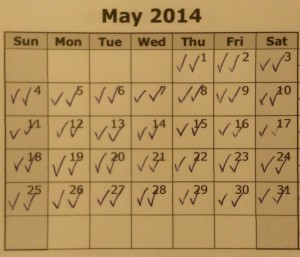 I recently completed my first month of the Chain Habit. It was so easy that I wish I started a long time ago. It’s as simple as making a commitment to take a specific action every day, no matter what. My commitments are “one book sentence, one blog sentence.” Small and achievable.
I recently completed my first month of the Chain Habit. It was so easy that I wish I started a long time ago. It’s as simple as making a commitment to take a specific action every day, no matter what. My commitments are “one book sentence, one blog sentence.” Small and achievable.
Admittedly, some days are easier than others. My best days are when I get out of bed around 6AM and get right to work on revising my manuscript or writing a blog post. Other days, like yesterday, I feel such resistance that I didn’t open my word document until late in the evening. I’m working on a chapter about being financially prepared before quitting a job, and the individual topics aren’t flowing together easily. All day instead of working on this chapter, I imagined myself staring at the pages, not knowing how to fix them. It was overwhelming.
That reluctance carried over into everything on my to-do list. I felt immobilized all day, unsure of which project or task to work on from one moment to the next. I didn’t feel like doing anything, yet was propelled by anxiety to do something. Finally, at 9:30PM last night, I opened my word document and worked on my manuscript. I deleted some sentences, moved paragraphs around, and created a completely new worksheet to help people estimate their current and future expenses. Progress.
Revising my manuscript isn’t the hardest thing I’ve done – not even close. I like the process of editing. In fact I recently revised two bulky process documents as part of my consulting work, and enjoyed doing it.
You know what the hard part of reworking my book is? Sitting in my chair, opening my word document and doing it. Finding the inner motivation is the hard work.
As I mentioned, it’s easier when I get started first thing in the morning. It also helps when I take a piece of notepaper and write down what I want to accomplish the night before. And receiving a compliment about my writing is often enough to make me stop whatever else I’m doing and start working on my book or a blog post. Is that a character flaw that external praise makes me get to work? I don’t care if it gets one more page out of me.
As an aside, I took Samuel Delaney’s workshop at the Summer Writing Program last summer. His perspective was that criticism is a better motivator than praise. His reasoning? After one of his books got outstanding reviews, he did nothing but walk around smiling for three days. And then he read a harsh review that was so unsettling to him that he immediately went to his desk and got to work again. He’s one of the most prolific authors I’ve ever heard of, so clearly that worked for him. I’m going to stick to the positive reinforcement.
As another aside, it was in Delaney’s workshop that I started writing my book.
Another character flaw is that it motivates me when I read something that I don’t like from an author who has sold a lot of books or who has great endorsements. It makes me think that my own book doesn’t have to be a masterpiece; it just needs to be published. And then I get back to work.
It took me thirteen hours before I did any writing and editing yesterday. And I suffered needlessly all day while I put it off. But I finally revised a few pages, and worked on a blog post and now I get to make two check marks on the calendar propped up next to my desk. Whatever works.
An Abundance of Time, No Time to Waste
I had an abundance of free time.
After I quit my job and returned home from my summer writing program, I had things to do. Those things just didn’t take up much time. The startup business that I co-founded moved very slowly. I met with my business partner once each week and I completed the tasks I was responsible for in a few hours in between those meetings. And, I started writing a book. But I was only able to write for an hour or two a day before the part of my brain responsible for getting coherent sentences onto my PC would shut off.
That left a lot of free time.
I’d wake up in the morning, make tea, meditate, and then…
Exactly. And then what?
Exercise most days. Go to a writing group, visit a friend for lunch, read, or take a walk. Attend meetings for associations I belong to. Read poetry at open mic events. A little consulting and volunteering here and there. I took an eight-week improv acting class, visited three wild animal rescue centers, traveled to Idaho for a retreat and took two trips to California.
It wasn’t that I was wasting time. In fact I refused to waste time by watching tv, aimlessly surfing the web, playing games on my phone or doing anything that didn’t feel meaningful. I refused to be busy for the sake of distracting myself. And so without much distraction, I had A LOT of time to experience a full range of thoughts and feelings that otherwise I wouldn’t have time for.
It felt like I was on an endless silent retreat, left alone with my thoughts and feelings.
Some feelings were positive. Getting plugged into the Seattle writing community was fun and interesting, and sometimes I felt happy and excited about the projects I was working on. But I often felt uncertain and doubtful about whether I was spending my time on the right things. Should I be traveling more or volunteering overseas, since I had so much flexibility? There were plenty of hours when I was restless and wanted something else to do besides work on my business or write, but I didn’t know what.
Then I felt guilty for not enjoying the luxury of time that I had.
I made a list of activities that I felt were justifiable ways to spend my time. The title of this word document was “Meaningful Ways to Spend My Time that Align With My Values.” I’m not kidding. The list wasn’t all about work; it included options like gardening, hanging out at the park and emailing friends. Having an approved list of activities was an attempt to feel OK about how I was spending my time but it didn’t help much. I had a relentless sense of needing to be productive and make a positive contribution to the world. It’s both grandiose and deeply true.
I had great days when I got a lot of writing done or took an inspiring class. I had many more days when I felt like an unanchored boat being tossed by the waves.
All of that changed when I started a full time consulting position. I am much happier now, no question about it. I still write, work on my business, go to yoga and see friends. I have plenty of time, energy and the flexibility for those things beyond my day job. I didn’t need that list of approved activities – I needed predictable work that took up more time, gave me structure, earned income and allowed me to contribute on a daily basis.
Some people might do well with a lot of unstructured free time. Those people are either more enlightened than me or less driven. Or maybe they just like tv.
The Value of Less
One of my favorite things about the time I spent in Boulder at the Jack Kerouac School was living in my simple student apartment.
From the moment I walked in the door, I loved it. Even though it was a small one bedroom apartment it felt spacious and airy because there was hardly anything in it. It took me thirty minutes to put away all the belongings I brought with me. Another thirty minutes to rearrange my bed and desk.
Without stuff, life is simpler.
I had one suitcase worth of clothes, my computer, notebooks and not much else. The apartment came with a sofa, table, chairs, bed, desk and a few pieces of cookware and utensils in the kitchen. No microwave. No extra stuff – just the basics to live day to day.
It didn’t take long to decide what to wear because there wasn’t a lot to choose from. Which of my three tank tops to wear with jeans? Or which of my four dresses to pull on? If I was going to school, I wore my sandels. If I was walking anywhere else, sneakers.
I got so much writing done sitting at the desk in my bedroom. The walls were blank, so all of the ideas came from my head. No visual stimulation to distract me.
Returning home after living so sparingly was a shock. I felt like my house was screaming at me. Everywhere I looked there was stuff.
I decided to get rid of half of everything I owned. Much of what I had didn’t make sense for my new life. They were artifacts of the old life that I left behind when I quit my job and went out on my own. I didn’t want the clothes that I used to wear to work hanging up in my closet. I didn’t want boxes of computer equipment clogging up my bookshelf. I wanted blank space.
It was a good goal, but getting rid of half of everything I owned turned out to be more ambitious than what I was prepared to part with. After carloads of donations dropped off at the Goodwill, I hadn’t given away a even quarter of what I owned, and there were things that I wasn’t ready to part with. I wasn’t ready to give away the furniture that I inherited after my grandparents passed away. I didn’t want to get rid of Christmas decorations, cheese knives or nail polish. Even though I rarely use those things, the last thing I intended was to get rid of something only to repurchase it when I wanted it later.
I changed my goal to creating an empty drawer or shelf in every room of the house. That was doable.
I love these pockets of blank space. Especially around my desk, where I work. The less stuff I have in my line of sight, the more ideas make it out of my head and onto my PC.
I still have more stuff than I need or want. But I have much more breathing room.
Sometimes The Outline Happens Last
I have been frustrated that I’m not making as much progress on my book as I wanted to. I finished the first draft in December and my goal was to revise it to the point where I could hand it off to a professional editor by the end of February. But it’s halfway through March and there’s a ton of rework to do before it’s ready for editing.
The biggest challenge I’ve had with the revision process is that the document hasn’t been well-organized. This book was born from a four-page outline that I wrote as a class assignment last July at the Jack Kerouac School. The outline describes what happens when people want to quit their jobs but feel stuck, talks about how to break through those barriers, and goes on to offer a plan for making an exit.
I still like that outline! But when I started writing the actual content I thought I needed to simplify it to three sections about timing, money and how to set yourself up for a positive experience after you’ve left your job. That format was easier for me to describe to people and seemed like a good container to fill. But I pretty quickly got into a bind when I wanted to write about topics that didn’t fit into either one of the outlines. At that point I was stuck for weeks and the only writing that happened was poetry and journaling.
Finally I gave myself permission to write whatever the hell I wanted to for my book. I had a running list of topics that I logged in a spreadsheet. When I sat down at my PC to write, I would either look at the list or just write whatever I felt like writing. I would open my word document, create a bold header for whatever the topic was about, and get to it.
On December 30th, the day that I finished my rough draft, I had an idea for a third outline based on steps that people could take to quit their jobs comfortably. I was thrilled with this last-minute inspiration because it sounded like something agents and publishers would go for. You know, “the seven steps to quit like a winner”. It has a great ring to it, don’t you think?
However, the more I reflected on it over the following weeks, I wasn’t sure those seven steps were really necessary, and there were topics I cared about that didn’t line up with this version of an outline either.
The problem I created for myself by adding section after section into my word document based on whatever I felt like writing each day was that there was no logical order. My draft was 100 pages of single spaced text and scrolling through page after page to find sections that seemed like they would fit together in chapters wasn’t working very well.
I thought that printing out the manuscript would help. I made a copy and started going through it with a red pen. But I sensed it was a wasted effort because I couldn’t see how the pieces connected to each other or the book as a whole.
I’d heard of authors spreading their manuscript pages on the floor and then walking around, sorting them. Maybe they have bigger living rooms than I do? I got about 50 pages down on the carpet before I ran out of room.
And there wasn’t enough space left for me to walk around and rearrange the papers, so I ended up walking on the paper, which made me feel like I was insulting myself. Milo, my cat, was confused at first and then he started walking on the papers, too. Cats are always happy to insult people.
Then I thought maybe it would be better if I got a pad of Post-its that I could write editing comments on and stick to the papers. Like, “move this section to the introduction.” I made a few notes, stuck them on the papers, and then Milo wanted to go out on the deck and a big gust of wind blew the papers all over. Enough of that.
But the notes gave me an idea. I wrote the different topics of the book on individual Post-its and saw patterns emerge. Before long I grouped each topic that I had written about into chapters, and moved the chapters into a logical order. They are now tidily laid out on my dining room table.
A bunch of pink Post-its might not seem like a big deal, but it is a big step towards making my book a reality. Now I can go back through the printed manuscript and re-order the pages to match the chapters, and then make revisions knowing how each topic flows into the next.
It would have been a much easier process if I could have written the book in order all the way from the introduction to the afterward. I love plans – planning is smart, saves time and helps get results. But that’s not how it went. Sometimes the outline happens last.


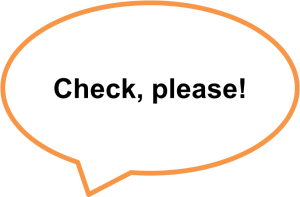

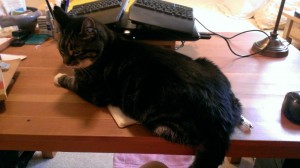
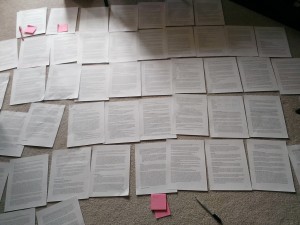

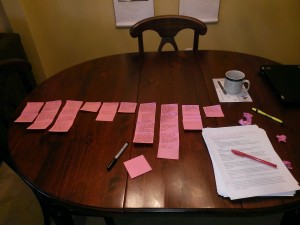
Recent Comments